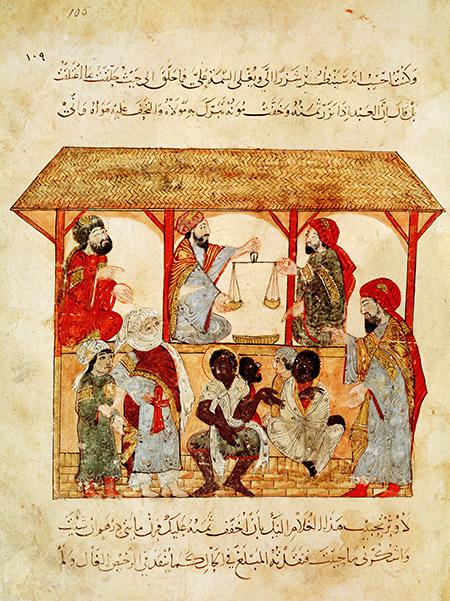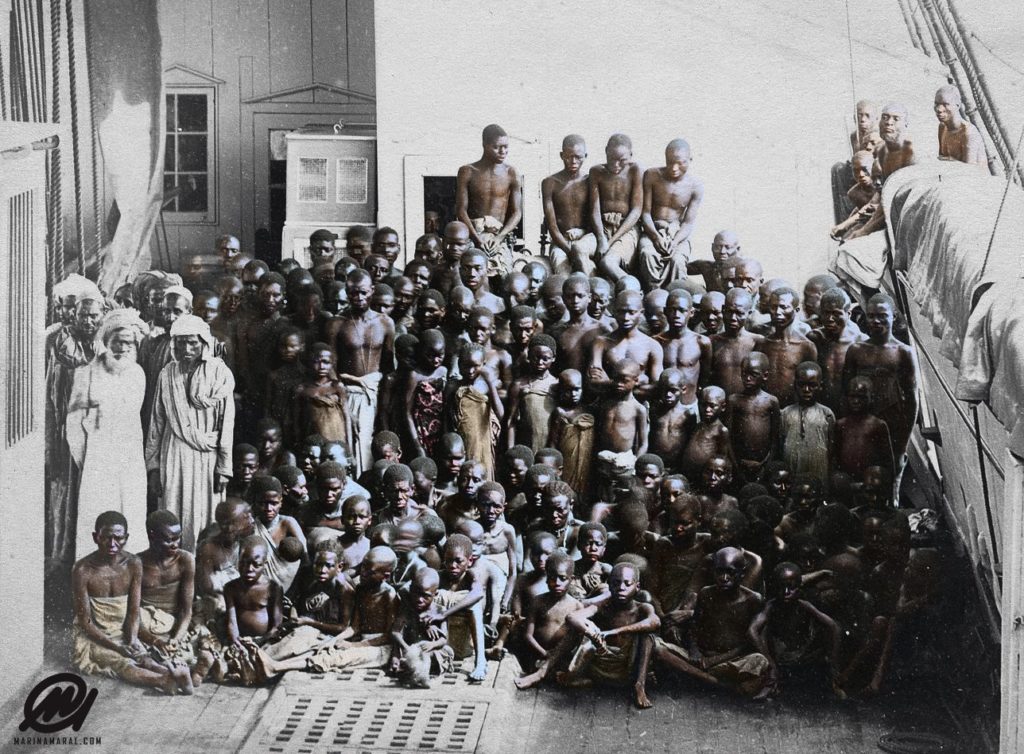On the website Sudan Online an Islamist wrote an essay entitled ‘How Muslims lost by abolishing slavery.'[i] Its author bemoaned the divine good deeds that Muslims were deprived of by the abolition of slavery because they can no longer manumit a slave as atonement for their sins. I could not believe that someone in the twenty-first century could bemoan the prohibition of slavery, but the ideology we were raised with has cancelled out our human emotions, such as man’s love for his fellow man, and has cancelled out our minds.

EVER SINCE MAN achieved stability in agricultural societies, he has known wars and the capture and enslavement of the vanquished. In pastoral societies such as Arabia, wars were waged to plunder animals for the benefit of their milk and meat due to the lack of food to sustain life. They were also conducted to enslave women so as to produce the largest number of boys, in a bid to strengthen the tribe.
Thus enslavement in the Arabian Peninsula prior to Islam was confined to importing slaves from Africa, such as ‘Antara ibn Shaddād, whose mother was an Abyssinian. But as regards Arab males, the defeated were either killed in battle or returned to his home after having suffered the loss of his dignity, his livestock and women, and thus to prepare for the next battle. This is why the ‘days of the Arabs’, the warfare among them, lasted for centuries.
Islam came and exploited this fear factor in describing hell in a way that would send shivers down the spine
The religious figures in pre-Islamic Arabian Peninsula instrumentalised the moral fear of the torment of the Hereafter, which made some adherents of religions at the time donate themselves as slaves to the gods, so that they may feel compassion for them and relieve them of the torment of the Hereafter.
We thus find tribes and individuals calling themselves ‘slaves’ to those metaphysical forces, and adopting names such as: ‘Abd Shams, ‘Abd Manāf, ‘Abd al-‘Uzzā, ‘Abd al-Lāt, ‘Abd al-Qays, ‘Abd al-Muṭṭalib, ‘Abd Manā, ‘Abd al-Ashhal, ‘Abd Madān and ‘Abd al-Shahri. But the majority of people and tribes named themselves after predator animals, bearing the auspicious names of predators such as the lion, the tiger and the leopard. Some called themselves by the names of solid, strong elements such as a stone, a rock, a sword and a bow, hoping that they would become hard like their namesake. Others named their children after lowly animals in their eyes, such as a dog, a lizard or fox, to fend off from them the evil eye.
Then Islam came and exploited this fear factor in describing hell in a way that would send shivers down the spine, and made people ‘slaves of God’ instead of being just His ‘creatures’. Thus in the Qur’ān we have:
Inform My servants that I am the Forgiving, the Merciful, And that My punishment – that is a painful punishment! [Qur’ān XV (al-Ḥijr), 49-50].
In order to avoid this painful torment Muslims accepted this slavery to God, and to confirm this they named their children by the names evoking slavery. Thus their children became slaves not only to God but to all of His Most Beautiful Names. For example, we find: ‘Abdallāh, ‘Ubaydullāh, ‘Abd al-Raḥmān, ‘Abd al-Raḥīm, ‘Abd al-Ma‘būd, ‘Abd al-Malik, ‘Abd al-Mālik, ‘Abd al-Quddūs, ‘Abd al- Qayyūm, ‘Abd al-Samī‘, ‘Abd al-‘Alīm, ‘Abd al-‘Ālim, ‘Abd al-Wāḥid, ‘Abd al-Aḥad, ‘Abd al-Khāliq, ‘Abd al-Nūr, ‘Abd al-Salām, ‘Abd al-Mu’min, ‘Abd al-Muhaymin, ‘Abd al-‘Azīz, ‘Abd al-Jabbār, ‘Abd al-Bārī, ‘Abd al-Ghaffār, ‘Abd al-Ghafūr, ‘Abd al-Wahhāb, ‘Abd al-Razzāq, ‘Abd al-Rāziq, ‘Abd al-Fattāḥ, ‘Abd al-Bāsiṭ, ‘Abd al-Ḥakīm, ‘Abd al-Ḥakam, ‘Abd al-Laṭīf, ‘Abd al-Ḥalīm, ‘Abd al-‘Aẓīm, ‘Abd al-Shakūr, ‘Abd al-Ḥafīẓ, ‘Abd al-Ḥāfiẓ, ‘Abd al-Jalīl, ‘Abd al-Karīm, ‘Abd al-Wadūd, ‘Abd al-Majīd, ‘Abd al-Mājid, ‘Abd al-Haqq, ‘Abd al-Ḥamīd, ‘Abd al-Ḥayy, ‘Abd al-Ṣamad, ‘Abd al-Qādir, ‘Abd al-Qadīr, ‘Abd al-Birr, ‘Abd al-Ra’ūf, ‘Abd al-‘Āṭī, ‘Abd al-Mu‘ṭī, ‘Abd al-Hādīi, ‘Abd al-Bāqī, ‘Abd al-Ṣabūr, ‘Abd al-Mawlā, ‘Abd al-Mun‘im, ‘Abd al-Ilāh, ‘Abd al-Rabbuh, ‘Abd al-Sātir, ‘Abd al-Sattār, ‘Abd al-‘Āl, ‘Abd al-Muta‘āl, ‘Abd al-Maqṣūd, ‘Abd al-Maḥmūd, ‘Abd al-Muṭṭalib, ‘Abd al-Muḥsin, ‘Abd al-Manān, ‘Abd al-Rafī‘, ‘Abd al-Nāṣir, ‘Abd al-Rashīd, ‘Abd al-Ghanī, ‘Abd al-Mughnī, ‘’Abd al-Raqīb, ‘Abd Rabb al-Ḥusayn, ‘Abd Rabb al-Rasūl, ‘Abd al-Tawwāb.
How can a reasonable person call his son ‘Abd al-Muhīn (‘Slave of the Humiliator’) or ‘Abd al-Jabbār (‘Slave of the Oppressor’)?
How can a reasonable person call his son ‘Abd al-Muhīn (‘Slave of the Humiliator’) or ‘Abd al-Jabbār (‘Slave of the Oppressor’)? We note here that these slavery names are limited only to men, while women do not attain the level worshippers of God because they are demons who tempt men to commit sins, since the male is not like the female[ii] as Zakariyā’s woman said.
Not satisfied with slavery to God they volunteered to be slaves to human beings like themselves, so they named their children: ‘Abd al-Nabī, ‘Abd al-Rasūl, ‘Abd al-Amīr, ‘Abd al-Ḥusayn, ‘Abd al-Zahrā’, ‘Abd al-Imām, ‘Abd al-Sāda, ‘Abd al-Mahdī, ‘Abd al-Riḍā’ and ‘Abd al-‘Alī. This is a strange phenomenon that we find only in Islamic names. We do not, for example, find in the West anyone calling their children ‘the slave of Jesus’, the ‘slave of Zeus’ or the ‘slave of Apollo’, although the Europeans passed through stages of paganism, pluralism and then Christianity. Curiously, some Christians in the Arab East were influenced by this environment and called their children ‘Abd al-Masīḥ – ‘the slave of the Messiah’, even though Jesus Himself told them that they were Children of God. Even so, they opted for slavery in line with the Arab spirit that was addicted to slavery.
Even enslaved circus animals in the West have their defenders
The West, which in the BC era knew slavery in Athens, Rome and elsewhere – whether resulting from wars, or non-payment of debts – gradually eliminated slavery. They did this either voluntarily or by force, as Abraham Lincoln did in America, and apologized for their past. They set up museums that tell the story of slavery, to demonstrate their shame about their past. Even enslaved circus animals in the West have their defenders who have been able to force municipal councils in most cities to prohibit circus owners from using animals in their performances.
Yet here we have an Islamic writer who is not ashamed to lament the abolition of slavery as something that has deprived them of gift of manumitting a person whom they had no right to enslave in the first place.
In the Arab world, being addicted to slavery for fear of God and the swords of Muḥammad, the Muslims became strong when they conquered neighbouring countries and the region of North Africa and allowed themselves to enslave the vanquished. After that, when the number of male and female slaves in the state of Islam had increased, the jurists of Islam came along and gave legitimacy to slavery, to fear and to blind obedience. They classified this in the following way:
Blind obedience begins in childhood to the father or stepfather, who up to the age of ten beats them to make them pray;
Then it continues in the school where the teacher is blindly obeyed and allowed to beat children in order to instil in them total obedience (you have the meat and we’ll have the bones);[iii]
The jurists of Islam came along and gave legitimacy to slavery, to fear and to blind obedience.
Then when a Muslim grows up, he blindly obeys his guardian because the guardian is the representative of God among the slaves, and the Qur’ān prescribed obedience to the guardian: Obey … those in authority from among you.[iv]
The top of the pyramid of blind obedience is obedience to the Prophet and obedience to God.
The Qur’ānic text has:
These are the limits (imposed by) Allah. Whoso obeyeth Allah and His messenger, He will make him enter Gardens underneath which rivers flow. [Qur’ān IV (al-Nisā’), 13].
That is, slavery is rewarded by heaven. It also has:
O you who believe! obey Allah and obey the Messenger and those in authority from among you [Qur’ān IV (al-Nisā’), 59].
Muḥammad later said,
Whoever teaches a slave a verse from the Book of Allah will become his slave.[v]
The Muslim thus became a slave to Islamic ideology, a slave to God and his rulers. After they savoured this slavery, they began their blessed conquests and enslaved the men and women of the countries they conquered, so that ‘Abd Allāh had many slaves.
The Muslim thus became a slave to Islamic ideology, a slave to God and his rulers
‘Abd Allāh tried to justify his possession of male and female slaves, claiming that they were treating them as if they were free, and came up with hadiths claiming this:
There is no superiority of an Arab over a non-Arab, or a non-Arab over an Arab, or a black over a white or a white over a black – other than in the level of their piety. All of you are from Adam, and Adam is from dust.[vi]
However, as is the custom of Islam in contradicting its own texts, the same jurists wrote volumes on the jurisprudence of slaves and stuffed them with verses from the Qur’ān and hadiths in order to place all possible restrictions on them. For example, we find in the Qur’ān verses that allow the mulk al-yamīn (possession) of captives and allow the Muslim man to marry this mulk al-yamīn unconditionally, even if the slave-girl has become a Muslim. More than that, they place the slave lower than the rank of the free:
And whoso is not able to afford to marry free, believing women, let them marry from the believing maids whom your right hands possess [Qur’ān IV (al-Nisā’), 25]..
A Believer who cannot financially marry a free and chaste woman should marry one of the Muslim slaves. The Muslim slave-girl is inferior to the free Muslim woman. The same meaning is found in the hadith:
Obey your ruler, even if he is an Abyssinian slave with a head like a raisin.[vii]

Suggested Reading
In what way are Muslims ‘defeated when they abolished slavery’? – 2
The exaggerating word ‘even’ here is intended to diminish, and Muḥammad knew that the one whose ‘head is like a raisin’ cannot be the ruler over the Believers because in another hadith he said this:
The authority to rule will remain with the Quraysh, even if there are only two of them remaining alive [viii]
And further:
If a slave runs away, no prayer will be accepted from him until he goes back to his masters.[ix]
How can this servant, whose prayers are not accepted if he frees himself, become a ruler of the affairs of the Believers?
[i] (For the Arabic reader): This is the article (linked) I am talking about, and I ask the reader to look at this before he continues with this article so that he can get an idea of the type of mindset that we are dealing with.
[ii] Qur’ān III (Āl ‘Imrān), 36. Ibn Kathīr explains this phrase as the male is not like the female ‘in terms of strength, steadfastness in worship and service to the al-Aqṣā Mosque’. (Ed).
[iii] An old turn of phrase meaning: “I allow you to beat my son to raise him and teach him”.
[iv] Qur’ān IV (al-Nisā’), 59.
[v] Imam al-‘Ajlūnī, كشف الخفاء Hadith no. 2543.
[vi] Ibn Taymiyya, الفتاوى الكبرى Vol.11, p.195.
[viii] Ṣaḥīḥ al-Bukhārī, 3501.
Main image: The Slave Market from a 13th century Yemeni manuscript of Al-Ḥarīrī’s Maqāmāt

